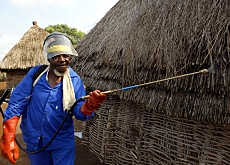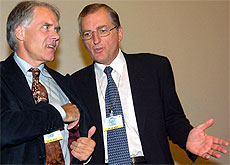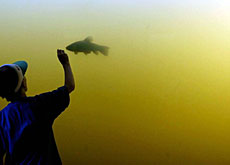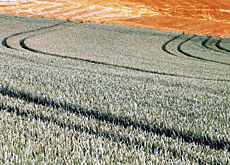Swiss invite “Dirty Dozen” to Geneva

Switzerland is hoping Geneva will become the new headquarters for the Stockholm Convention, backing up its reputation as a hub for environmental protection.
The parties to the convention, which regulates the use and production of chemicals known as the “Dirty Dozen”, will decide this week in Uruguay on a new home for the treaty.
On Monday more than 600 delegates from 130 countries are set to convene in the city of Punta del Este to discuss implementation of the convention, which came into effect last year.
The treaty, which covers 12 persistent organic pollutants (POPs), aims to limit production and usage of highly toxic chemicals around the world.
These include dioxins, polychlorinated biphenyls (PCBs) and DDT. Experts say all these chemicals are detrimental to people’s health and the environment.
Industrialised nations like Switzerland have already taken steps to eliminate them, but they are now having to address their use in other countries.
“POPs can be easily transported by air or water,” said Beat Nobs, head of international affairs at the Swiss environment agency. “It’s in our own interest to avoid pollution from emissions abroad.”
Cut emissions
The treaty is focusing most of its attention on developing and emerging countries. These nations will receive technical and financial assistance to cut emissions from POPs.
This includes finding ways of replacing POPs with less harmful substances, upgrading industrial installations and eliminating stocks without harming the environment.
“These substances are dangerous and can be detrimental to people’s health, especially in developing countries,” Nobs told swissinfo. “It’s important that Switzerland contributes along with the international community to getting rid of them everywhere.”
The Uruguay meeting, the first since the convention was signed, will also consider whether more chemicals should be added to 12 already covered by the treaty.
The Swiss have a major card to play in Punta del Este. The convention’s secretariat, which has been based temporarily in Geneva, is looking for a permanent home.
The city wants to host the headquarters but is facing competition from Italy, which wants the pesticides section to go to Rome.
But Nobs says it was never the intention of those who drew up the convention to split up its different sections.
“It would run counter to what the experts who signed the treaty wanted,” he added.
Ideal candidate
According to the Swiss environment agency, Geneva is the ideal candidate. Nobs said the city was now a major player on the environmental stage thanks to its International Environment House.
The agency added that Geneva was also a centre of competence for dealing with chemical products and waste. It is home to the European chemical section of the United Nations Environment Programme and the secretariat of the Basel Convention on Transboundary Movements of Hazardous Wastes.
These agencies have set up shop at the International Environment House, which lies near major UN bodies such as the World Health Organization (WHO) and the World Trade Organization (WTO).
According to the Swiss, this proximity would improve decision-making and help develop synergies within the UN structure.
“Chemicals are a commodity and also have widespread effects on people’s health, so we need to work with the major UN organisations like the WHO and the WTO,” said Nobs.
A decision is expected on May 6.
swissinfo, Scott Capper
Dirty dozen:
Aldrin – pesticide
Chlordane – pesticide
Dieldrin – pesticide
DDT – pesticide
Endrin – pesticide
Heptachlor – pesticide
Mirex – pesticide
Toxaphene – pesticide
PCBs – industrial chemicals
Hexachlorobenzene – pesticide and industrial chemical
Dioxins – industrial byproducts created by car emissions and the burning of waste
Furans – toxic byproducts of waste burning and industrial production
The Stockholm Convention on Persistent Organic Pollutants targets 12 particularly toxic POPs for reduction and eventual elimination.
It has a mechanism for tackling additional chemicals identified as unacceptably hazardous.
The treaty also channels resources into cleaning up existing stockpiles and dumps of POPs.

In compliance with the JTI standards
More: SWI swissinfo.ch certified by the Journalism Trust Initiative




You can find an overview of ongoing debates with our journalists here. Please join us!
If you want to start a conversation about a topic raised in this article or want to report factual errors, email us at english@swissinfo.ch.